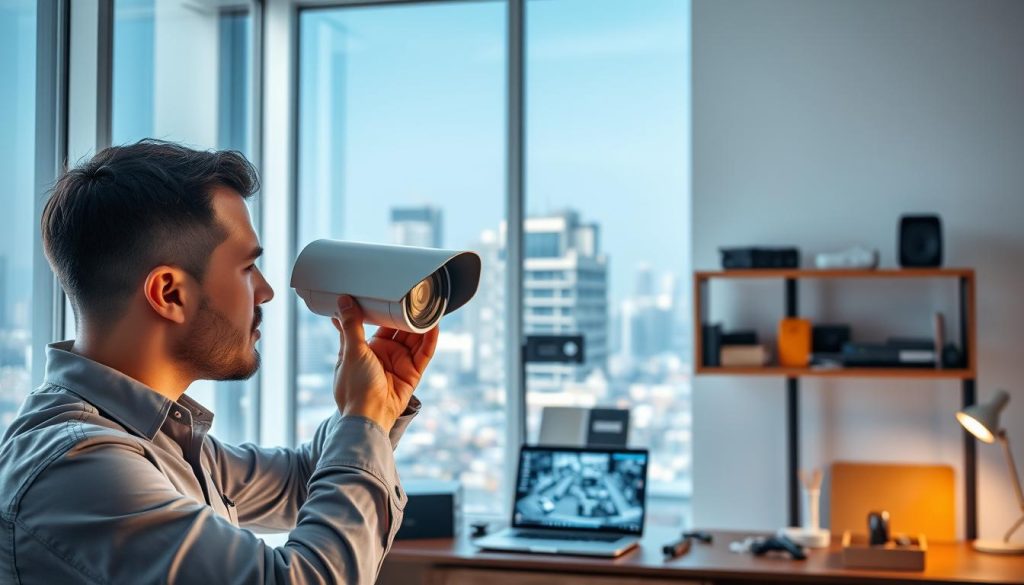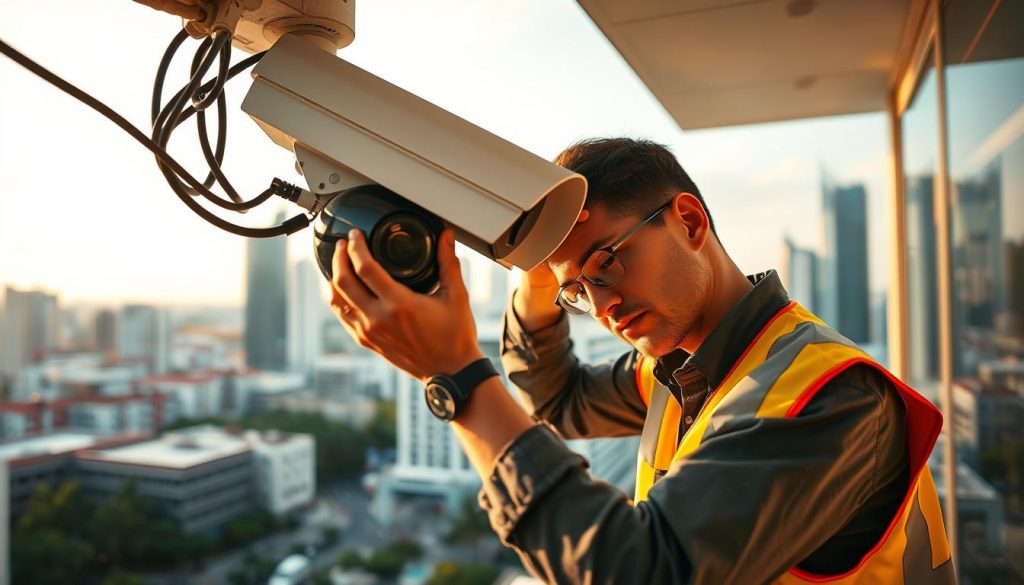In Singapore’s fast-paced city, keeping CCTV cameras in good shape is key. These cameras help protect properties and keep people safe. But, they need regular care to work right.
Regular checks make sure your cameras are ready when you need them most. If you ignore this, your security could fail. This could lead to big problems.
By keeping your cameras in top condition, you also follow local laws. This helps protect your stuff and keeps everyone safer.
Key Takeaways
- Regular CCTV maintenance is essential for optimal performance.
- Neglecting maintenance can lead to security risks.
- Upkeep extends the lifespan of security cameras.
- Compliance with local regulations is reinforced through maintenance.
- Surveillance system checks prevent costly failures.
- Effective maintenance assures safety in urban environments.
Importance of Regular CCTV Maintenance
Investing in a security system is key for any business. But, it needs ongoing care to stay effective. Regular CCTV maintenance boosts system reliability, making sure everything works well. Business owners must focus on this to avoid future problems.
Enhances System Reliability
Regular CCTV maintenance makes systems more reliable. Routine checks catch problems early, preventing big issues. This approach ensures clear video and keeps all equipment in top shape, avoiding surveillance failures.
Prevents Expensive Repairs
Ignoring CCTV maintenance can cause costly repairs. Issues like blind spots or poor image quality can arise. These problems can quickly become expensive for businesses. Regular maintenance helps avoid these costs and keeps the system in good shape.
What are the Types of Maintenance of CCTV?
It’s important to know the different types of CCTV maintenance. Each type has its own role. They help keep the system working well for a long time.
Preventative Maintenance
Preventative maintenance means regular checks and replacing parts before problems start. This way, you avoid system failures and extend the life of your CCTV gear. It also helps find issues early, saving money and improving security.
Corrective Maintenance
Corrective maintenance fixes problems after they happen. While it’s needed, it can cost more and take longer than preventative maintenance. When repairs are sudden, your security might be at risk until fixed.
Predictive Maintenance
Predictive maintenance uses data to guess when maintenance is needed. It watches how the system performs to see when it might fail. This method keeps your equipment running smoothly and cuts down on unexpected downtime.
Do CCTV Cameras Need Maintenance?
Yes, CCTV cameras need regular maintenance to work their best. This upkeep is key to keeping your surveillance system running smoothly. It also helps avoid blind spots. By doing regular checks, you can make your cameras more reliable and last longer.
Benefits of Regular Checks
Regular maintenance brings many benefits:
- Enhanced Functionality: Regular checks keep everything, like lenses and storage, working right. This makes your system more effective.
- Early Issue Detection: Spotting small problems early can save you from big repair costs later.
- Increased Security: Keeping your equipment in good shape helps prevent security issues. It gives you peace of mind.
- Improved Performance: A well-maintained system gives you clearer images and better monitoring. This boosts your security overall.
CCTV Maintenance Checklist: Essential Components
A detailed CCTV maintenance checklist is key to keeping surveillance systems running smoothly. Regular checks of important CCTV parts help spot problems early. This ensures your system works at its best. Knowing what to check and how often is critical to avoid issues.
Key Areas to Inspect
- Camera lenses for clarity and cleanliness
- Power supply connections for stability
- Wiring for signs of physical damage
- Storage devices for sufficient capacity and functionality
- Software for updates and security patches
Recommended Frequency of Inspections
Setting a regular maintenance schedule is essential for system reliability. Daily checks are the first step in good maintenance. Monthly lens cleaning keeps images clear. Professional checks every six months give a detailed system review.
Following this schedule helps avoid CCTV failures. It also boosts your security system’s performance.
Understanding Different Types of CCTV Systems
Choosing the right CCTV system is key for surveillance. Each type has its own features and upkeep needs. These factors greatly impact how well and reliably they work.
Wired CCTV Systems
Wired CCTV systems are a classic choice for many. They use cables to send power and data. It’s important to check the cables and connections often to avoid signal loss.
Keeping connections tight helps these systems last longer.
Wireless CCTV Systems
Wireless CCTV systems are great for their flexibility. They don’t need lots of cables, which is a big plus. But, they need regular checks on signal strength and battery life.
Checking these things keeps the system working well for surveillance.
IP-based CCTV Systems
IP CCTV systems use digital tech for better performance and image. They connect to local networks and send high-definition video. It’s vital to update their software and firmware to stay safe from cyber threats.
Keeping IP CCTV systems up to date keeps them working right and protects your network.
Knowing the differences helps pick the best system for your security needs. Regular maintenance that fits the type of system ensures it works its best. For more on upkeep, check out servicing frequency.
Common Issues Faced During CCTV Maintenance
Technicians often find several common problems during CCTV maintenance. These issues can affect how well the system works. Fixing these problems quickly helps keep the system running smoothly and securely.
Camera Lens Issues
Camera lens problems are a big challenge. Dust, dirt, or misalignment can make images blurry. It’s important to clean and check the lens regularly.
Owners should check the lenses often. This keeps them clear and working well.
Wiring and Connectivity Problems
Wiring issues can cause problems with video feeds. Damaged cables or loose connections are common culprits. It’s key to check wiring for any damage.
Fixing wiring problems early helps keep the system running. This makes it more reliable.
Storage Capacity Issues
Storage problems can stop the system from recording important footage. Having enough storage is essential. It’s important to check storage regularly.
This ensures old footage is saved and new recordings can be made without issues.
Creating a CCTV Maintenance Schedule
Creating a solid CCTV maintenance schedule is key for good surveillance management. It helps keep security cameras working well. This plan makes sure all parts get checked regularly, keeping the system in top shape.
Weekly Tasks
- Check camera angles to ensure proper coverage.
- Review system logs for any operational errors.
- Test motion detection and other critical features.
Monthly Tasks
- Clean camera lenses to maintain video clarity.
- Inspect cables for any signs of wear or damage.
- Update firmware to enhance functionality and security.
Annual Professional Services
- Conduct a thorough system audit to check performance.
- Review storage solutions and expand if needed.
- Schedule upgrades to hardware or software as required.
CCTV Maintenance Best Practices
Keeping your CCTV system in top shape is key. Regular cleaning and checking the equipment are musts. They help spot and fix problems early on.
Regular Cleaning
Make sure to clean the camera lenses every three months. Dust and dirt can really mess up the camera’s view. Keeping them clean means better images and a more reliable system.
Inspection of Equipment
It’s important to check your CCTV gear often. Look for any damage or wear that might affect how it works. Regular checks help find and fix issues before they get worse. This keeps your system running smoothly, following CCTV maintenance best practices.
Benefits of Regular CCTV System Inspections
Regular checks on CCTV systems bring big advantages. They make the system work better and more reliably. These audits spot problems early, so you can fix them fast.
By keeping your system in top shape, you get better security. This is key in today’s world.
Improved Security and Performance
Regular checks mean better security. This is very important today. With top-notch surveillance, you miss nothing.
These inspections keep cameras working well. This boosts safety for everyone.
Extended Lifespan of Equipment
Regular checks also make your equipment last longer. This means fewer breakdowns and less need for new parts. It saves money in the long run.
By focusing on maintenance, you can use your budget for other things. This is a big win for any organization.

Choosing a Professional CCTV Servicing Provider
When looking for a CCTV servicing company, several key factors are important. The reliability and experience of the provider are critical. Look for companies with a good reputation and positive feedback from clients. This shows they can handle CCTV systems well.
It’s also vital to check if the provider knows the local CCTV laws in Singapore. Companies that offer custom maintenance plans can better meet your specific needs. This tailored approach is very helpful.
Lastly, consider the emergency support offered by the provider. Quick help can be a big advantage when urgent issues come up.
Impact of Poor CCTV Maintenance
Ignoring regular maintenance of CCTV systems can cause big problems. It can make security operations much harder. One major issue is the increased risk of security risks. Cameras that aren’t well-maintained might show unclear images or stop working altogether.
This makes them less effective in preventing crime or capturing important moments. System failures from poor maintenance can also cause big problems. For example, they might lose connection, creating blind spots in surveillance.
This leaves important areas unwatched and open to danger. The effects of neglecting CCTV maintenance go beyond just security issues. They can also lead to legal problems if evidence is questioned because of bad recordings.
To avoid these risks, businesses need to focus on keeping their CCTV systems in good shape. Regular checks and maintenance improve system reliability. They also help protect against the damage that can come from security breaches.

